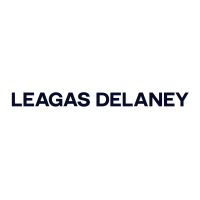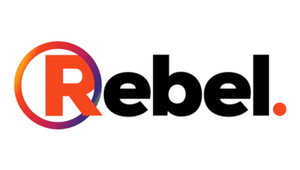
Planning for the Best: Work Hard, Be Kind and Stay Curious with Alice Schaffer
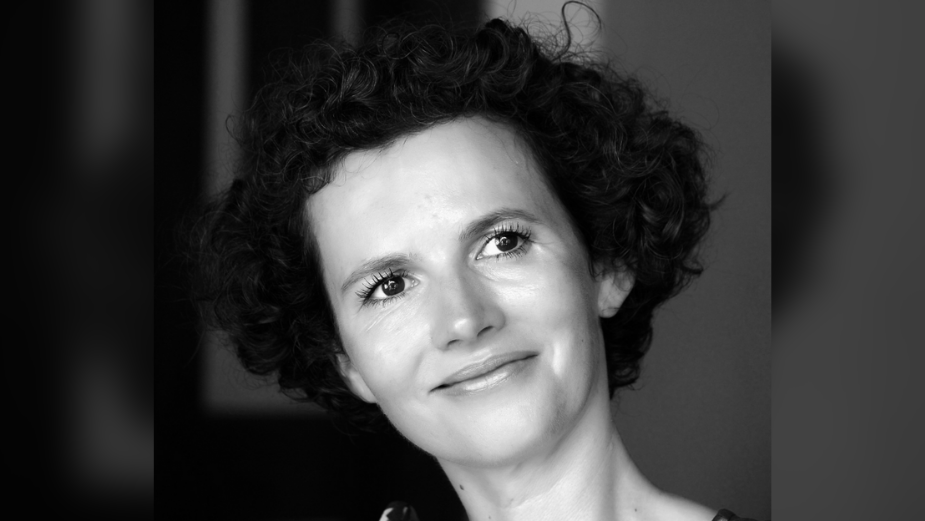
Alice Schaffer is strategy partner at Leagas Delaney London. Alice began her career at one of the two agencies to claim the invention of planning (BMP DDB), going on to work at the other (J Walter Thompson) some years later. Alice’s experience includes both global and local roles and spans a wide range of clients and sectors. Throughout her long career she has seized opportunities to work with, and learn from, some of the best in the business, and in turn enjoys mentoring and nurturing talent (who, she says, also teach her a thing or two).
LBB> What do you think is the difference between a strategist and a planner? Is there one?
Alice> Maybe there is a difference, but if there is it isn’t universally understood. In my experience it’s the same job, different title, that’s all. Back in the previous century when I was at BMP, the ‘home of planning’, the disgruntled Account Planners argued for a change of name, as they felt ‘Account Planning’ suggested a role more akin to management accountancy than anything in the creative industries. It didn’t come to pass then but maybe we were ahead of our time…
LBB> And which description do you think suits the way you work best?
Alice> Either. Both. I think of myself as a planner but find that ‘strategist’ seems to be more widely understood. I’m all for clarity, so let’s go for that.
LBB> We’re used to hearing about the best creative advertising campaigns, but what’s your favourite historic campaign from a strategic perspective? One that you feel demonstrates great strategy?
Alice> I’m drawn to ideas that have the power to endure. I love the Patek Philippe ‘Generations’ campaign. The strategic stroke of genius was recognising that a Patek Philippe is not just a luxury timepiece but an heirloom to be handed down. The emotional potency of this insight is captured in the line ‘You never actually own a Patek Philippe. You merely look after it for the next generation’. The campaign has now been running for over twenty-five years, during which time it has helped to make Patek Philippe arguably the most distinctive and desirable luxury watch brand in the world.
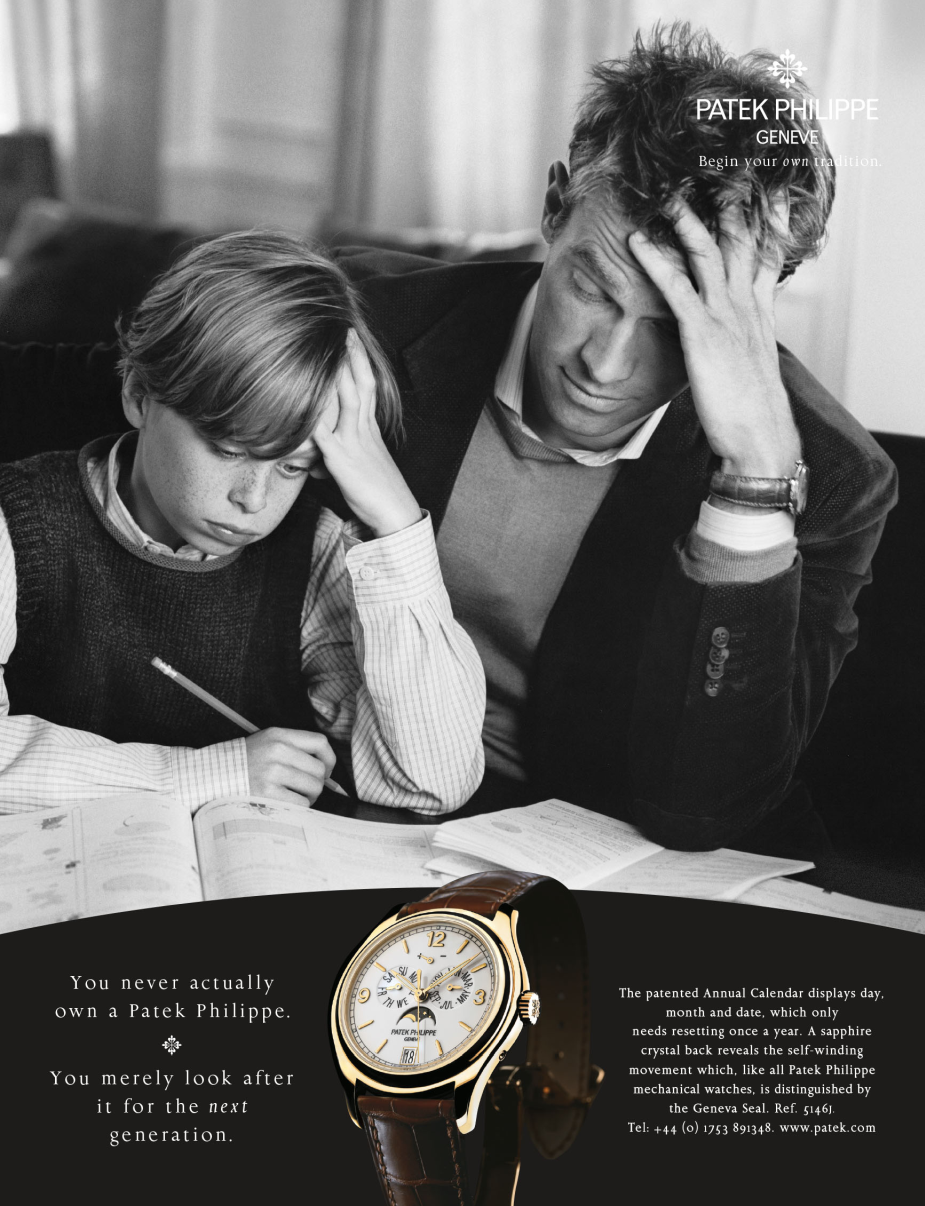
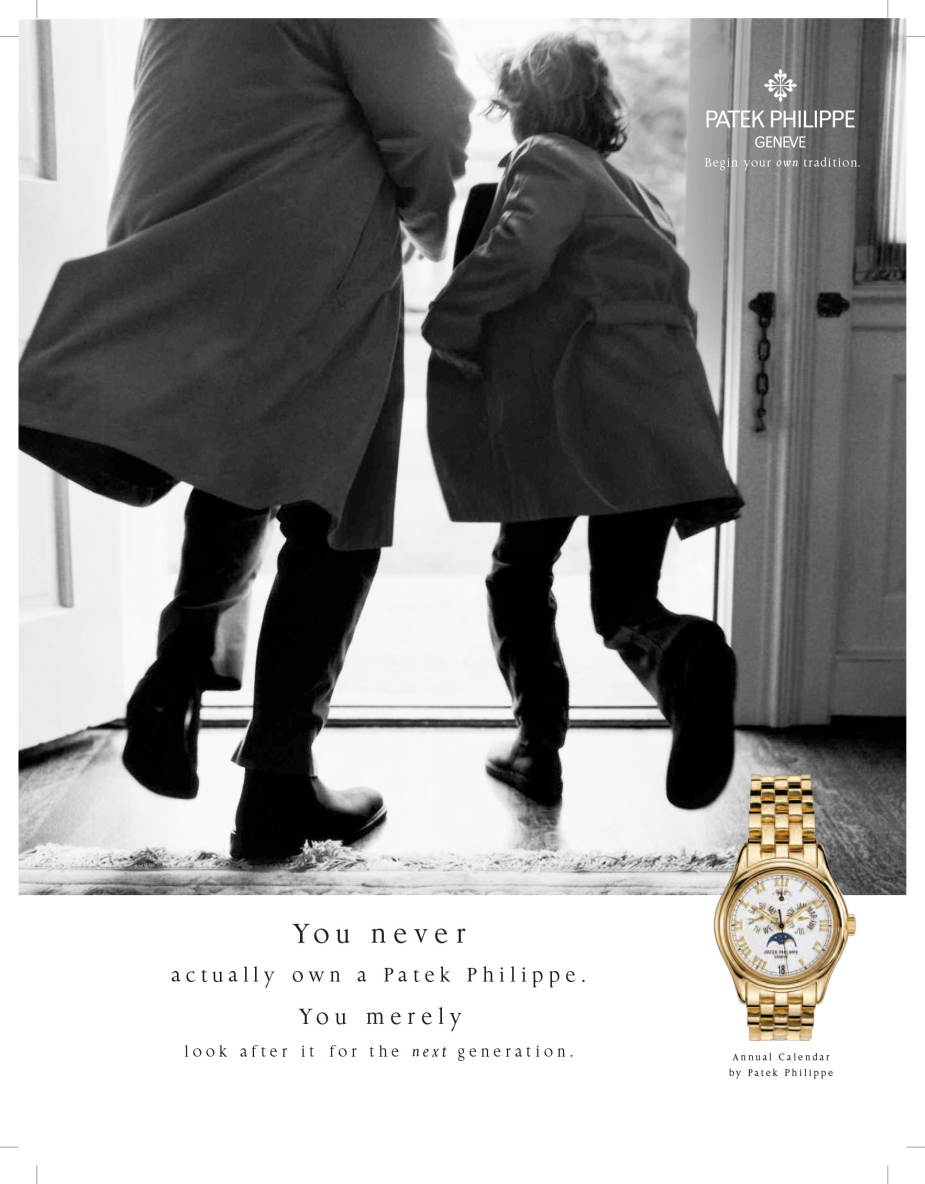
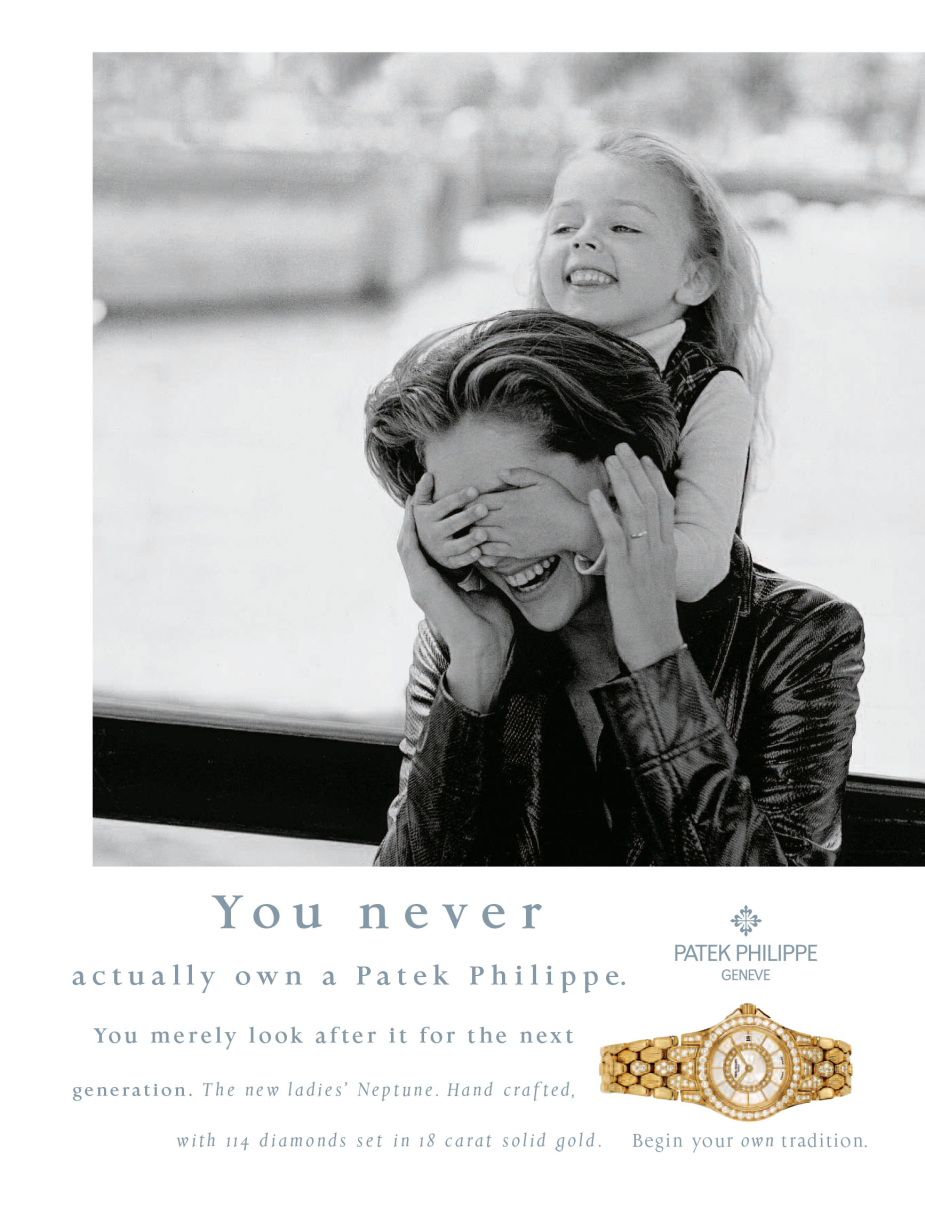
LBB> When you’re turning a business brief into something that can inform an inspiring creative campaign, what do you find the most useful resource to draw on?
Alice> Human beings. Spending time talking & listening to your audience, ideally in their own environment, trying to see the world from their perspective and understand what makes them tick. Insights can come from many places, the wealth of data now available for us to mine can be a rich resource, and of course we must draw information and inspiration from multiple, varied sources. But at the end of the day, our job is to make emotional connections with people and for that nothing beats hearing it from the horse’s mouth and putting yourself in someone else’s shoes.
LBB> What part of your job/the strategic process do you enjoy the most?
Alice> The endless variety that comes with the role. Every brand is different and faces different challenges and opportunities. Although basic human nature stays the same, culture is continuously shifting and there is always so much to learn, whatever the task. In the last year I’ve had to give myself a crash course in steel manufacturing, deep dive into the history of caviar and understand the impact of the pandemic on the mental health of emergency responders… to name but a few.
As I’ve always been lucky enough to work at agencies with strong strategic credentials, I’ve tended to work with clients who respect and value their planners. This has given me the opportunity to get involved in solving a wider variety of problems than some might imagine for a traditional ad agency planner. So, I’ve also found myself creating brands from scratch, developing & naming new products, guiding packaging redesign, writing & delivering marketing training modules, and even ‘translating’ econometric modelling reports into easily understood, jargon free, presentations.
All this keeps me on my toes: learning, stretched, fascinated, and a little bit scared.
LBB> What strategic maxims, frameworks or principles do you find yourself going back to over and over again? Why are they so useful?
Alice> Principles: the work of Byron Sharp and Binet & Field. It’s fair to say I’m particularly attracted to their work because their conclusions align with my intuitive understanding of how people choose brands and how advertising works. But unlike my intuition, their conclusions are evidence based, coming as they do from the sound analysis of enormous amounts of data and decades of research. Strangely, I find that quoting their evidence carries more weight than my assertions alone, so it is beyond useful to have their work to refer to.
A strategic maxim I’m forever trotting out: Emotion drives attention, memory and decision making. Paraphrased from ‘How brands grow’ with thanks, once more, to Byron Sharp. Useful because oftentimes the importance of making an emotional connection can be underestimated or overlooked in the face of a shiny new piece of information to impart or the desire to prompt an instant reaction.
LBB> What sort of creatives do you like to work with? As a strategist, what do you want them to do with the information you give them?
Alice> I have the most fun working with creatives who like to talk things over and bash ideas around together. Those who see the ‘creative-planner’ relationship as a genuine partnership. Not everyone likes to work like that and that’s fine too. I’m continually in awe of the leaps creatives make when they turn something rationally sound into something emotionally powerful, so I happily flex my approach to suit the style of those I’m working with, as needed.
LBB> There’s a negative stereotype about strategy being used to validate creative ideas, rather than as a resource to inform them and make sure they’re effective. How do you make sure the agency gets this the right way round?
Alice> Be useful. Make a difference. The clarity and insight planning brings is valuable at all stages of the process, but particularly so at the outset. Having strategy involved at the beginning makes the creative process both easier and more efficient. We get to better solutions, more quickly, with less reworks and less grief. Once a team has experienced the impact, on both quality and efficiency, that good planning can bring then they tend to demand more and more of it, and bring it into the process earlier and earlier.
LBB> What have you found to be the most important consideration in recruiting and nurturing strategic talent? And how has Covid changed the way you think about this?
Alice> I’m looking for intellectual rigour combined with down-to-earth common sense; an ability to sort the wheat from the chaff, to simplify the complex (and to not complicate the straightforward!); a love of people, brands and creativity; curiosity; integrity and a cheerful disposition. These last two are, selfishly, for my sanity if we are to work together.
It goes without saying that Covid has made recruitment and nurturing talent more difficult. Full-time WFH removed almost all spontaneous, informal support and took much of the joy out of working with others. It tested the resilience of us all and left many burnt out. As we appear to be finally emerging from enforced isolation we face a new challenge: how should we be working now that we can work together in person but we have also proved it’s possible to work remotely? Is there a way to satisfy both those who prefer to work remotely and those who prefer to be office based? It sounds simple enough but the reality is complex since the choices of each individual affect the experience of others. Making hybrid working work is not as straightforward as many might like to believe. I have a feeling we are all going to have to learn to compromise and be happy doing so.
LBB> In recent years it seems like effectiveness awards have grown in prestige and agencies have paid more attention to them. How do you think this has impacted on how strategists work and the way they are perceived?
Alice> I hope it has promoted a culture of effectiveness not just within planning departments but more widely within agencies, particularly among senior management. Evaluation isn’t a task a planner can undertake in isolation. They need the support and cooperation of clients, media partners and account management if an agreed measurement strategy is to be put in place before activity goes live, and to have access to the relevant data – as well as the time to undertake the analysis.
As the profile of effectiveness has been raised, I hope it has also encouraged agencies to provide their planners with the training and resources to undertake evaluations with confidence. The IPA offer excellent course in effectiveness and the wealth of effectiveness case studies now available provide plenty of inspiration, guidance and best practice examples to all who are keen to develop their skills in this important area.
LBB> Do you have any frustrations with planning/strategy as a discipline?
Alice> This is a frustration with the industry as a whole, but I see the crime as particularly heinous when committed by planners: being out of touch with the very people our communications are intended to reach. Living in a creative industry bubble. Forgetting that we are not representative of our target audiences and being too lazy or arrogant or complacent to actually make an effort to genuinely understand and empathise with those we wish to influence. Rant over.
LBB> What advice would you give to anyone considering a career as a strategist/planner?
Alice> If you enjoy solving problems, love advertising (in the broadest sense of the word) and are genuinely interested in understanding how to connect with people from all walks of life, then it can be an endlessly stimulating, satisfying and sometimes even thrilling, job. You’ll work hard but you’ll laugh a lot. You’ll be paid a fraction of what lawyers or management consultants bring home, but you won’t be bored. And you’ll spend your days collaborating with and learning from smart, eloquent, creative, inspiring people. If you do choose to join the industry: Work hard. Be kind. Stay curious.







